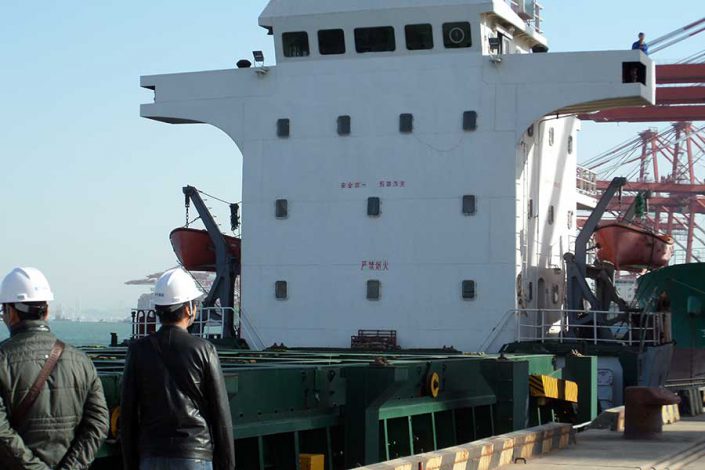Bulk Cargo Transportation
Qingdao ZHV International Logistics Co., Ltd. relies on the advantages of Qingdao Dongjiakou bulk cargo terminal and bulk cargo fleet. It is specialized in the marine freight business for the import and export of bulk cargo and general cargo, and provides one-stop services for the import and export goods, such as warehousing, customs declaration, inspection application, port receiving, settlement of port miscellaneous charges and so on. As a first-class freight forwarding company, zhanhuawei can directly provide importers and exporters with accurate bulk cargo shipping schedule information and timely feedback, reduce intermediate links, save customer costs, improve work efficiency and enhance market competitiveness. Zhanhuawei has maintained good and close relations with a number of shipping companies in China and the world, and has a highly competitive advantage.
Bulk cargo usually refers to bulk, granular and powdery goods without fixed packaging or without packaging, such as ore, coal, bulk salt, etc., with different packaging forms. The bulk carriers are cape type and Panama type large bulk carriers. They are in good condition. They can provide the whole process services of chartering, space booking and cargo tracking according to the actual situation of customers’ goods. For ocean routes such as Southeast Asia, the Middle East and Africa, bulk cargo customers can load and ship at any time according to the customer’s shipping time.
Bulk cargo transportation includes:
Bulk cargo can be transported by chartering or booking. Chartering means that the ship owner leases the ship to the charterer. The mode of transporting goods according to the provisions of the charter party or the arrangement of the charterer is generally applicable to the transportation of large quantities of bulk cargo. Booking space means that the consignor agrees with the shipping company to book space for the transportation of goods. It is generally applicable to the transportation of general cargo.
The terms of bulk cargo transportation mainly include:
Liner clause
Liner terms, also known as berth terms or gross terms, means that the ship owner is responsible for employing stevedores and paying the loading, unloading and stacking expenses. Specifically, at the loading port, the charterer is only responsible for delivering the goods to the wharf and the ship’s side and placing them under the ship’s hook, and the ship owner receives the goods where the ship’s hook reaches; At the port of discharge, the ship owner is responsible for delivering the goods under the ship’s hook, and the charterer receives the goods under the ship’s hook. As for the division of expenses, it is also completely based on this standard.
In shipping practice, some people mistakenly believe that as long as the liner terms are stipulated in the contract, such transportation should be carried out in accordance with the conditions of liner transportation. In fact, it is not. The so-called liner clause only imitates the liner’s practice on the sharing of handling charges, that is, the ship owner shall bear the handling charges without involving other rights and obligations.
Clause that the lessor shall not bear the loading cost
The f.i. clause, also known as the in cabin receipt clause, is not borne by the shipowner. Under this clause, the shipowner is only responsible for receiving the goods in the hold at the loading port, and the loading expenses shall be borne by the charterer, while the expenses incurred at the unloading port shall be borne by the shipowner.
Clause that the lessor shall not bear the unloading fee
This clause is also called F.O. According to this clause, the shipowner shall pay the loading fee at the loading port, the shipowner shall only be responsible for delivering the goods in the hold at the unloading port, and the unloading fee shall be borne by the charterer.
Clause that the lessor shall not bear the handling fee
The f.i.o. clause, also known as in hold delivery clause, is not borne by the shipowner. Under this clause, the shipowner is only responsible for receiving and delivering the goods in the hold, and the charterer shall employ stevedores at the loading and unloading ports and bear the loading and unloading expenses.
Clause that the lessor shall not bear the loading, unloading, stowage and leveling expenses
The lessor shall not bear the loading, unloading, stowage and leveling fee clause (f.i.o.s.t.), also known as the stowage fee clause. This clause is completely contrary to the liner clause. The ship owner shall not be responsible for all expenses related to loading and unloading, and all employed loading and unloading workers and related loading and unloading expenses shall be borne by the charterer. Under this clause, the binding fees and binding materials required for the shipment of large goods shall also be borne by the lessee. However, in order to avoid unnecessary disputes, the word “lashed” should be specified in the contract when transporting large cargo, so as to indicate that the ship owner is not responsible for the lashing fee. Similarly, if the words “dunnages” are added after the above provisions, it indicates that the lessor shall not bear the dunnage expenses except for the above expenses.
(Liner terms), f.i., F.O., f.i.o., f.i.l.o. and fiost. At present, the domestic bulk cargo market usually uses Liner terms (i.e. pipe loading and unloading terms) and FIO (regardless of loading, regardless of unloading at the port of destination) and fiost (regardless of pipe loading and unloading).
Contact now: +86-18253269597






